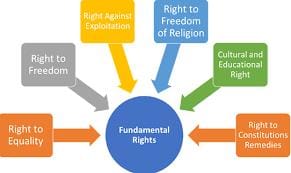Our Rights and Duties - 2 Class 4 Worksheet SST
Q1: Correct and Rewrite the Following Statements.
(i) "The right to equality means that all citizens are equal before the law."
(ii) "The right against exploitation ensures that poor people are not made to work without pay."
(iii) "Exploitation means to treat someone unfairly in order to get some benefit."
(iv) "The Constitution of India expects the citizens to perform certain duties towards the country."
(v) "The Directive Principles listed in our Constitution were adopted from the Constitution of Ireland."
Q2: Write Any Two Differences Between the Following.
(i) Fundamental Rights and Directive Principles
(ii) Right to Equality and Right against Exploitation
Q3: Name the Following.
(i) The day on which the Indian Constitution came into effect.
(ii) The Fundamental Right that guarantees freedom of religion.
(iii) The person known as the architect of the Indian Constitution.
(iv) The set of guidelines in the Constitution for the government's welfare efforts.
(v) The duty of parents or guardians mentioned in the Constitution.
Q4: Short Answer Questions.
(i) What is the significance of Republic Day in India?
(ii) Who is regarded as the architect of the Indian Constitution?
(iii) Explain the concept of Fundamental Rights.
(iv) What are Directive Principles in the Indian Constitution?
(v) Name one Fundamental Duty that citizens of India are expected to perform.
You can find Worksheets Solutions here: Worksheet Solutions: Our Rights and Duties - 2
|
47 videos|121 docs|42 tests
|
FAQs on Our Rights and Duties - 2 Class 4 Worksheet SST
| 1. What are some of our rights and duties as citizens? |  |
| 2. How are rights and duties different? |  |
| 3. What is the name of the worksheet that discusses our rights and duties? |  |
| 4. Can you provide some frequently asked questions related to the topic of rights and duties? |  |

|
Explore Courses for Class 4 exam
|

|

















